By the time I got outside the bus had already left课件1
九年级英语unit 10句型

UNIT 10句型1.当我出来时,汽车已经开走了。
By the time I got outside, the bus had already left.2.当我到达学校时,我意识到我把钥匙丢在了家里。
、When I got to school, I realized I had left my keys at home.3.他如此让人信任以至于数百人相信了这个故事。
He was so convincing that hundreds of people believed this story.4.当当局揭露这是个骗局,成千的人已经逃离了家园。
By the time the authorities revealed it was a hoax, thousands of people had fled from their homes.5.你和你的妻子结婚多久了?How long have you been married to your wife?(be married to sb.是延续性动词,可以和how long, for+一段时间连用)I have been married to my wife for ten years.6.由你决定。
Up to you.7.Jim 和Tom 的妈妈等一会将来我的办公室。
Jim and Tom’s mother is coming to my office in a moment.(两人共有的在第二人后加‘s)8.你打算去即将在Smith家举办的派对吗?Are you going to the party to be held at Smith’s home?(动词不定式作后置定语)9.太阳在东方升起,西方落下。
The sun rises in the east and sets in the west.。
【教育学习文章】Unit 10 By the time I got outside, the bus
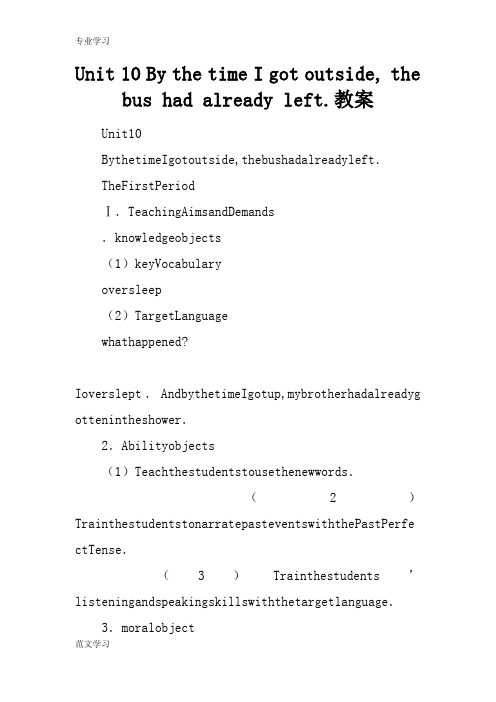
Unit 10 By the time I got outside, the bus had already left.教案Unit10BythetimeIgotoutside,thebushadalreadyleft.TheFirstPeriodⅠ.TeachingAimsandDemands.knowledgeobjects(1)keyVocabularyoversleep(2)TargetLanguagewhathappened?Ioverslept.AndbythetimeIgotup,mybrotherhadalreadyg ottenintheshower.2.Abilityobjects(1)Teachthestudentstousethenewwords.(2)TrainthestudentstonarratepasteventswiththePastPerfe ctTense.(3)Trainthestudents’listeningandspeakingskillswiththetargetlanguage.3.moralobjectIt’sagoodhabittogotobedearlyintheeveningandgetupearlyi nthemorning.Soyou’llneverbeinahurryinthemorning.Ⅱ.TeachingkeyPoints.keyVocabularyoversleep2.TargetLanguageNarratepasteventswiththePastPerfectTenseⅢ.TeachingDifficultPoints.TrainthestudentstonarratepasteventswiththePas tPerfectTense.2.Trainthestudentstounderstandthetargetlanguageins pokenconversation.Ⅳ.Teachingmethods.Thinkingofexamplesfromthestudents’reallives.2.makingsentencesbylookingatthepictures.Ⅴ.TeachingAidAtaperecorderⅥ.TeachingProceduresStepIRevision.RevisethelanguagepointsinUnit8.Asksomequestionslikethis:whatvolunteerworkwouldyoul iketodo?Helpthestudentstoanswer,I’dliketo…/Iloveto…/Ihopeto…2.PracticethedialogueinActivity3conpage62again.Ge tstudentstoroleplaythesimilardialogueswiththefollow ing.SA:I’dliketojointheschoolvolunteerproject,butI’mnotsurewhatIshoulddo.SB:whatdoyoulikedoing?SA:Iloveplayingfootball.SB:well,youcouldhelpcoachafootballteamforlittlekids .Letthechildrenpracticeinpairs.3.checkthestudents’homeworkbyaskingsomestudentstoreadtheirsentenceswit hthephrasalverbs.Thenaskthestudentstohandintheirho mework.4.Dictatethefollowingwords:cleanup,cheerup,giveout,putoff,setup,runoutof,takea fter,fixup,giveaway,callup,handout,workout,hunger,establish,commit ment,veterinarian,strategyStepⅡ1aThisactivityintroducesnewvocabularywhichcanbeusedto narratepastevents.Firstwritebythetimeontheblackboard.andtelltheclass themeaningofit."bythetime"meansnotlaterthan,before,assoonas,orwhen theindicatedcomes.whenweusethewords."Bythetime…, "wearetalkingabouttwodifferentthingsthathappenedint hepast.Saythissentencetotheclass:Bythetimetheteach ercamein,thestudentshadbegunreadingEnglish.Tellthemtonotethestruture"hadbegun"inthissentence.Begunisthepastparticipleofbegin.whenwetalkabouttwo eventsbothhappenedinthepast,theonewhichhappenedearliershoulduseandplusapastparticiple.Thewordsfollowi ngBythetime…,talkaboutthethingthathappenedlater.A ndtellthestudentswhentheyusehadplusapastparticiple, theyareusingthePastPerfectTense.Alsoexplainwhatist hepastparticipleformofaverbforthestudents.Tellthem itisasthesameasthepastformforaregularverb.Andtheyh avetoremembertheirregularverbs’participlesonebyone.Playagametohelpthestudentsunderstandthesentenceswit hthewordsBythetime…Doitlikethis:Pretendthattheteacherwillleavetheclassroomandthestu dentswilldosomethings.whentheteacherreturns.thecl asswillmakestatementsstartingwithBythetime…writeBythetimeIcameback…ontheblackboard.Saytotheclass,BythetimeIcamein.whathadhappened?Helponestudenttoanswerlikethis,Bythetimetheteacherc amein,Donhadwrittenhisnameontheblackboard.Thengetmorestudentstoanswerdifferently,suchas,Bythelimetheteachercamein,wehaddiscussedanEnglishproblem.Bythetimetheteachercamein,Ihaddrawnapicture.writethesesentencesontheblackboard,andteachthestude ntstoreadseveraltimes.Readtheinstructionstothestudentsandreadthesequestio nstotheclassaswell.whatdoyouusuallydoin,themorningbeforeschool?Doyouli kemorning?whyorwhynot?chooseonegoodstudenttoanswerthembysayingsomethinghe orsheusuallydoesinthemorning.Heorshemayanswerlikethis,Iusuallygetupearly,washmyfaceandhavebreakfast.Ilik emorningsbecausetheairisfresh,orIusuallygetupaslate aspossible.ThenIhavetowashmyfaceandhavebreakfastin ahurry.Ioftenrushtoschoolwithoutbreakfast.Sometim esIforgetsomethingathome.Idon’tlikemorningsbecauseIamalwaystoobusy.Thenhavethewholeclasspracticeinpairs.Askeachothert hequestions.Aftertheyfinishtalking,askoneortwopairstosaytheirco nversationstotheclass.correctthemistakestheymaymak ewiththeotherstudents.callthestudents’attentiontothepicturesinActivityla.Askstudentstote llwhattheysee.Say,Anysentenceswhichmakesenseareacceptedtodescribe thepictures.ThegirlinthepicturesisTina.Presentthenewwordsbypro vidingsentencesshowingthemeaningsofthemlikethis: T:whatcanyouseeinPicture1?S1:Shesleptalongtime.T:That’scorrect.Sheslepttoolate.Sheoverslept.classrepea t.Sheoverslept.Ss:Sheoverslept.T:whatdoyouseeinPicture2?S2:Herbrotherorsisterisinthebathroom.T:That’scorrect.Shewantstogointothebathroom.Shecan’tbecausesomeoneistakingashower.classrepeat.Someon eistakingashower.Ss:Someoneistakingashower.writethesewordsontheblackboard:overslept,takingashower,hadleft,leftherbackpackatho me.Thentellstudentstotalkaboutthepicturesingroupsoffou r.movearoundtheclassroom,listeningtostudentsandoff eringhelp.makesurethattheytalkinEnglish.Aftertheyallfinishtalking,askdifferentgroupstotellt heclassaboutthepictures.Theymaysaylikethis:Tinaoversleptinthemorning.Shewantedtogotothebathro om,butherbrotherhadalreadygottenintheshower.whenshegottothebusstop,thebushadalreadyleft.Shehadtoruntoschool.Aftershegottoschool,sherealize dshehadleftherbackpackathome.Thesentencescanvary,b utshouldbecorrect.StepⅢ1bThisactivitygivesstudentspracticeinunderstandingthe targetlanguageinspokenconversation.Askthestudentstoreadtheinstructionstogether.Haveth emlookatthetwocolumns,AandB,inthechart.Pointoutthe sampleanswer.Readthetwopartsofthesentence.Thengoovertheotherunconnectedpartsofsentences,too.youwillconnectthetwopartsofthesentences,connectasen tencebeginninginthefirstcolumnwiththeendofthatsente nceinthesecondcolumn.Pleaseguesstheothertwosentenc esbeforeIplaythetape.Iguessmostofthechildrencangetthecorrectsentencesbyguessing.Sojustletthemguess.Don’ttellthemwhethertheiranswersarerightorwrong.ok,justkeepyouranswersbyguessing.Let’sdecideiftheyarerightbylisteningtothetapenow.Playtherecordingforthefirsttime.Studentsonlylisten.Thenplayitasecondtime.Letstude ntsmatchtwopartsofeachsentence.checktheanswersbyas kingsomestudentstotelltheiranswers.makesurethatallofthemhavegotthecorrectanswersbylist ening.Saycongratulationstothestudentswhogettheansw erscorrectlybyguessing.Answers.b2.a3.cTapescriptBoy:Hi,Tina.youlookstressedout.Girl:Iam.Ihadabadmorning.Boy:Really?whathappened?Girl:well,firstofallIoverslept.BythetimeIgotup,mybrotherhadalreadygottenintheshower.Boy:oh,whatapain!Girl:So,afterhegotoutofshower,Itookaquickshowerandg otdressed.ButbythetimeIwentoutside,thebushadalread yleft.Boy:oh,no!Girl:oh,yes!SoIranallthewaytoschool.ButwhenIgottos chool,IrealizedIhadleftmybackpackathome.Boy:Nowonderyoulookstressedout.StepⅣ1cThispracticeprovidesguidedoralpracticeusingthetarge tlanguage.FirstplaytherecordinginActivity1b againandletthestudentsreadafterit.Doitatleasttwice.Thenreadtheinstructionstogetherwiththewholeclass.youwillmakeconversationsinpairs.EachofyouwillhavetotaketurnsbeingTina.LookatthepicturesinActivitylat ohelpyou.Tellyourpartnerwhathappenedtoyouthismorni ng.Askapairtoreadtheexampletotheclassbeforetheybeg irtSA:whathappened?SB:Ioverslept.AndbythetimeIgotup,mybrotherhadalrea dygottenintheshower.writetheconversationontheblackboard.Havethestudentsworkinpairs.movearoundtheroomofferi nglanguagesupportasneeded.Aftertheyallfinishtalking,asksomepairstosaytheircon versationstotheclass.StepⅤSummarySay,Inthisclass,we’velearnedhowtonarratepastevents,usingthePastPerfectTense.we’vealsodonesomelisteningpracticeinunderstandingtheta rgetlanguageinspokenconversation.Also,we’vedonemuchoralpracticeusingthetargetlanguage.StepⅥHomework.writeoutthestoryofTina,Notetousethetargetlang uage.2.RevisewhentousethePastPerfectTenseandtheverbstru ctureofit.StepⅦBlackboardDesignUnit9BythetimeIgotoutside,thebushadalreadyleft.SectionATheFirstPeriod.Bythetime…Bythetimetheteachercamein,thestudentshadbegunreadin g.Bythetimetheteachercamein,Donhadwrittenhisnameonthe blackboard.Bythetimetheteachercamem,wehaddiscussedanEnglishpro blem.2.Somewordstodescribethepicturesoverslept,takingas hower,hadleft,leftherbackpackathome.3.TargetLanguage:A:whathappened?B:Ioverslept.AndbythetimeIgotup,mybrotherhadalread ygottenintheshower.Unit9BythetimeIgotoutside,thebushadalreadyleft.TheSecondPeriodⅠ.TeachingAimsandDemands.knowledgeobjects(1)TargetLanguageBythetimeshegottoclass,theteacherhadalreadystartedt eaching.whenshegottoschool,sherealizedshehadleftherbackpack athome.whenIgothome,IrealizedIhadleftmykeysinthebackpack.(2)TheThreeFormsoftheverbs.2.Abilityobjects(1)Trainthestudents’listeningskill.(2)Trainthestudents’writingskillwiththetargetlanguage.(3)Trainthestudents’speakingskill.(4)Trainthestudentstousethethreeformsoftheverbs.3.moralobjectTrytobeacarefulpersonanddoeverythingcarefully.Reme mbernottobeascarelessasTina.Ⅱ.TeachingkeyPoints.Listeningpracticewiththetargetlanguage.2.Usethecorrectverbformstofillintheblanksbylisteni ng.3.makesentencesusingthePastPerfectTense.4.Thethreeformsoftheverbs.Ⅲ.TeachingDifficultPoints.writeanendingforthestoryinActivity2c.2.ThethreeverbformsinGrammarFocus.Ⅳ.Teachingmethods.Listening2.PairworkⅤ.TeachingAidsAtaperecorderⅥ.TeachingProceduresStepIRevision.RevisewhathappenedtoTinainthemorningbyaskingo neortwostudentstotellthestroyonpage68.Theymaysaylikethis:Tinahadabadmorning.Firstofallsheoverslept.Bytheti meshegotup,herbrotherhadalreadygottenintheshower.Andbythetimeshewentoutside,thebushadalreadyleft.Sh ehadtorunallthewaytoschool.whenshegottoschool,sher ealizedshehadleftherbackpackathome.Allthesemadeher lookstressedout.Afterthat,askthewholeclasstoworkin pairs,tellingthestroyandhelpingeachotherinturns.Re mindthemtousethecorrectverbforms.2.Askstudentstocheckeachother’shomeworkinpairs,pointingoutallthemistakestheymight havemade.3.RevisethePastPerfectTensebyaskingthechildrenwhen touseitandwhatitsverbstructureis.StepⅡ2aThisactivityprovidesguidedlisteningpracticeusingthe targetlanguage.wehaveknownTinahadabadmorning.ButsomethingworsehappenedtoTinalater.Let’sgotoActivity2aonpage69andseewhathappenedtoTinalate rinthemorning.Readtheinstructionstotheclass.Besurethatallofthemk nowwhattodo.callthestudents’attentiontothefourpictures.Getthemtoguessthecorrec torderofthepicturesfirst.Thefirstoneisgivenasasamp le.Askoneortwochildrentotelltheirstoriesbydescribi ngthepicturesaccordingtotheirownorder.Then,wewillhearTinatalkingaboutwhathappenedtoheraft ershegottoschool.wecanseethereisasmallboxineachpicture.Pleasewriteanumberfrom1to4ineachboxtoshoweachpictur e’scorrectorder.Thefirstonehasbeengivenasasample.GetthechildrentogetreadytolistentoTinacontinueherst ory.Playtherecordingthefirsttime,studentsonlylisten.Pl aytherecordingagainandaskthechildrentonumbereachpic ture.checktheanswerswiththeclassandseewhohaveevergotthec orrectanswerswithoutlistening.AnswersThepicturesshouldbenumberedinthisorder:3124TapescriptBoy:Sothenwhatdidyoudo,Tina?Girl:well,Iranhometogetmybackpack.ButwhenIgothome,IrealizedIhadleftmykeysinthebackpac k.Boy:you’rekidding!Girl:SoIranbacktoschoolwithoutmykeysormybackpack.A ndbythetimeIgotbacktoschool,thebellhadrung.Boy:oh,no!Girl:AndbythetimeIwalkedintoclass,theteacherhadstar tedteachingalready.Sheaskedforourhomework,butofcou rseIdidn’thaveit.StepⅢ2bThisactivitygivesstudentspracticeinunderstandingand writingthetargetlanguage.Askthestudentstoreadtheinstructionstogether.Pointo uttheblanksinthesentencesandtheverbsinthebrackets.Thisactivityhastwoparts.Firstlet’sfillintheblankswiththecorrectverbforms.wecanseeso meverbsinthebrackets.Theyarethebaseformsofthegiven verbs.Forexample,getandgot,Getisthebaseformoftheverb.yourjobistowritethecorrectformsoftheseverbsinth eblanks.Lookatnumberone.Asampleanswerisgiven.Letthestudentsfillintheblankswiththecorrectformsind ividually.movearoundtheclassroomcollectingthecommonmistakesth eymaymake.Aftertheyallfinishwriting,tellthemtogetreadytoliste ntotheconversationandchecktheiranswers.Iwillplaytherecordingagain.Pleasecheckyouranswersa ndcorrectanymistakesyoumighthavemadewhilelistening .Playtherecording.Studentslistenandchecktheiransw ers.correcttheanswersbyaskingsevendifferentstudent stosaytheirstotheclass.Answers.gothome2.realized3.hadleft4.got5.hadrung6.walked7.hadstartedStepⅣ2cThisactivitygivesstudentsoralpracticewiththetargetl anguage.Askthewholeclasstoreadtheinstructionstogether.wehaveanewtasknow.weknowTinawaslateforclass.whatd oyouthinkhappenedafterTinawaslateforclass?workwithapartner.makeupanendingforthestorybycontin uingit.Thebeginninghasbeengiven.Getstudentstodiscussinpairs.completetheending.mak esuretheyaretalkinginEnglish.movearoundtheclassroo m,offeringlanguagesupportifneeded.Aftertenminutes, askstudentstostopdiscussing.Getsomepairsofstudents totelltheclasshowtheythinkthestoryendedAndletthewho leclassdecidewhoseendingisthebest.Telleachpairtowr itedowntheirending,ordoitafterclassiftimeisnotenoug h.Sampleendingofthestory TheteacherlookedatTinaandsaid,"whyareyoulateandwhereisyourhomework,Tina?""Ihadabadmorningtoday."Tinas aidsadly."I’msorrytohearthat,butmayIknowwhathappened?saidthetea cher.ThenTinatoldtheteacherandthewholeclassherstory.All herclassmateslaughedloudlyafterit.Someofthemsaid," PoorTina!"Bob,oneofTina’sclassmates,stoodupandsaid,"well,Tina,I’dlovetohelpyou.whynotletmekeepthekeysforyou?Iwould putyourkeysinmybackpack."StepⅤGrammarFocusThisactivityintroducesthetargetlanguageofthisunit.callstudents’attentiontothesentencesontheleft.Askfourdifferents tudentstoreadthefoursentencesandpointoutwherehadplu sapastparticipleisused.writethesentencesontheblack board.Drawasimpletimelineforeachsentencetohelpstudentstou nderstandthegrammarfocus.Forexample:Thengetthestudentstolookatthebox.Teachstudentstoreadthethreeformsofeachverbsfirst.T henaskseveralstudentstoreadtheverbstotheclasstoseei ftheycanread.writetheverbsontheblackboard.Askthestudentstomakesentencescorrectlyusingeachform oftheverbsinthebox.Forexample:Iusuallygetupat6:30.Igotupat5:30yesterday.BythetimeIgotup,mysisterhadalreadygottenintheshower.Tellthestudentswhenwetalkaboutthefirstthingthathapp ened.weusehadplusapastparticiple(hadgotten)andwhenwetalkaboutthesecondthingthathappened,weuset hesimplepasttense (gotup).Asksometoreadtheirsentencestotheclass.Askthestudentstomaketheirownlistsofotherverbsusedinthisunit.Tellthemtoputthelistsintheirnotebooksusin gathree-columnformatliketheoneintheLook!section.Th elistshavetoincludetheseverbs;leave,walk,start,over sleep,ring,be.checktheanswers.Somesamplesentenceswiththethreeverbforms.Igotupat6:30everyday.Igotupat6:00yesterday.BythetimeIgotup,mysisterhadalreadygottenintheshower.2.weusuallygotoschoolat7:30.wewenttoschoolat8:30yesterday.Bythetimewegottotheclassroom,thestudentshadgonetothechemistrylab.3.myfatherleaveshomeat8:30.Helefthomeat9:30thismorning.whenmyfatherwentoutside,thebushadleft.4.Theteacheroftenstartsteachingat9:00.Theteacherstartedteachingat8:30thedaybeforeyesterda y.whenTinagottoclass,theteacherhadalreadystartedteach ing.Thethreeformsoftheverbsusedinthisunit:Leaveleftleftwalkwalkedwalkedstartstartedstartedoversleepoversleptoversleptringrangrungbewas/werebeenStepⅥSummarySay,Inthisclass,we’vedonemuchlisteningandwritingpracticewithtargetlang uage.we’vealsodonesomeoralpracticeinpairs.Andwe’vediscussedtheGrammarFocusofthisunit.StepⅦHomework.writedowntheendingofTina’sstory.2.makesentencesusingeachformoftheverbsbelow:leave,walk,start,oversleep,ring,be3.ReviewtheGrammarFocus.StepⅧBlackboardDesignUnit9BythetimeIgotoutside,thebushadalreadyleft.SectionATheSecondPeriodTargetLanguage:.Bythetimeshegotup,herbrotherhadalreadygoneint othebathroom.2.Bythetimeshewentoutside,thebushadalreadygone.3.Bythetimeshegottoclass,theteacherhadalreadystart edteaching.4.whenshegottoschool,sherealizedshehadleftherbackp ackathome.Verbs:GetgotgottenGowentgoneleaveleftleftstartstartedstartedUnit9BythetimeIgotoutside,thebushadalreadyleft.TheThirdPeriodⅠ.TeachingAimsandDemands.knowledgeobjects(1)keyVocabularybell,ring,gooff,rush,runoff,ontime,givesb.aride,lo ck,breakdown(2)TargetLanguageBythetimeIgotthere,thebushadalreadyleft.BythetimeIwokeup,myfatherhadalreadygoneintothebathr oom.2.AbilityobjectsTrainthestudents’readingskillwithtargetlanguage.Trainthestudents’speakingskillwithtargetlanguage.3.moralobjectHaveyoueverdoneanythingcarelessly?Shareyourstorywithyourfriends.Ⅱ.TeachingkeyPoints.Guidethestudentstoreadthearticleinactivity3a.2.Helpthestudentsdotheoralpracticewiththetargetlan guage.Ⅲ.TeachingDifficultPoints.Helpimprovethestudents’readingskillbyActivity3a.2.Helpthestudentsdescribewhathashappenedtothemwith thetargetlanguage.Ⅳ.Teachingmethods.Getthemainideabyreading.2.Pairwork.Ⅴ.TeachingAidAprojectorⅥ.TeachingProceduresStepⅠRevision.RevisewhathappenedtoTinabyaskingseveralstuden tstotellthestory.2.RevisethethreeformsoftheverbsinGrammarFocusbyask ingfourstudentstowritethemoutontheblackboard.3.checkhomeworkbyaskingoneortwotoreadtheirownendin gsofthestroy.4.checkhomeworkbyaskingsomestudentstoreadthesenten ceswhichtheymade.5.Askthestudentstohandintheirhomework.Somesamplesentenceswiththeverbsusedinthisunit:.Ileavehomeat7:30everymorning.Ilefthomeat8:00thismorning.BythetimeIgottotheairport,theplanehadleft.2.Iwalktoschoolsometimes.Iwalkedtoschoolyesterdayafternoon.whenIgotthere,thesickgirlhadwalkaway.3.Themeetingstartat3:00everywednesdayafternoon.Themeetingstartedat3:30lastwednesdayafternoon.Assoonasmr.jonesgottothemeetingroom,themeetinghada lreadystarted.4.Tinaseldomoversleeps.Tinaoversleptthismorning.Tinasaidshehadneveroversleptbefore.5.Thehellringsat8:10everymorning.Thebellrangat7:10thismorning.whenIgottoschool,thefirstbellhadrung.6.Iamherenow.Iwasathomelastnight.Ihadbeenherefor20yearsbytheendofXX.StepⅡ3aThisactivityprovidesreadingandwritingpracticeusingt hetargetlanguage.Showthevocabularyonthescreenbyaproject:belln.钟;铃ringv.鸣;响gooff闹钟(闹响)rushv.冲;奔rushoff跑掉;迅速离开ontime准时givesb.aride让某人搭便车lockv.锁;锁上breakdown损坏;坏掉Pointtothewordsonebyoneandteachthestudentstoreadthe m.Doitseveraltimes.Thenaskseveralstudentstoreadth ewordstoseeiftheycanpronounceeachwordcorrectly.Askthewholeclasstoreadtheinstructionstogether.Ther eisanarticleinActivity3a.yourtaskistoreadthestorya ndwritetheeventsinthecorrectorder.Havealookatthesampleanswerontherightofthearticlebef oreyoustart.Thenletthechildrencompletetheworkonthe irown.Afterawhile,asksomestudentstoreporttheiransw erstotheclass.writetheeventsontheblackboardastheyr eport,puttingtheeventsinthecorrectorder.Aftercheckingtheanswers,tellstudentstoreadthearticl eagainmorecarefully.Tellthemtofindoutthewordsorsentenceswhichtheycan’tunderstandthistime.Afewminuteslater,letthestudentsaskquestionsonthewor dsandsentenceswhichtheycan’tunderstand.Dosomeexplanationandmakesurethatthestu dentsmakeeverythingclearaboutthearticle.Thenaskthestudentstoreadthearticlealoud.movearound theclassroomwhiletheyarereading,offeringhelpasneede d.NextaskstudentstopickoutthesentenceswiththePastPerfectTense.Tellthemtounderlinethemandcomeupwiththere asontousethetence.Asktwostudentstoreadtheiranswersandexplainthesenten ces.Answers.alarmclockdidn’tgooff2.fatherwenttobathroom3.wokeuplate4.tookshower5.hadsomebreakfast6.busleft7.rantobusstop8.startedwalking9.gotaridewithafriend0.bellringing1.gottoschool2.gottoclassSentenceswiththePastPerfectTenseinthearticle:.…bythetimeIwokeup,myfatherhadalreadygoneintothebathr oomand…2.Unfortunately,bythetimeIgotthere,thebushadalread yleft.StepⅢ3bThisactivityprovidesreadingandwritingpracticeusingt hetargetlanguage.callthestudents’attentiontothephotoofthewomansleeping.Thegirlissle eping.Shemayoversleep.Howaboutyou?Haveyoueveroverslept?Getastudentstoanswerthequestionsimply,suchasyes,Iha ve./No,Ihaven’t.Thenaskonestudenttoreadtheinstructionstotheclass.wecanseesixquestionsinthebox.you’llhavetoreadthequestionsintheboxandyouhavetodescrib ethecircumstancesinwhichthesethingshappened.Explainthatdescribethecircumstancesmeanstotellwhen,whereandhowthethingshappened.Askonestudentwhohaseveroverslepttoanswerthefirstque stionanddescribethecircumstance.Helphimorherusethe PastPerfectTensetodescribethecircumstance.Thenaskstudentstoreadthequestionsandwritetheiranswe rsintheirexercisebooks.Tellthemthattheyhavetodescr ibethecircumstancesiftheiranswersareyes,andtheresho uldbeatleastonesentencewiththePastPerfectTenseineac hdescription.movearoundtheclassroomprovidingsenten cestotheoneswhoneed.Askseveralstudentstosharetheir storieswiththeclass.correctanymistakestheymaymake .Letthemchecktheanswersinpairs.StepⅣ3cThisactivityprovideslisteningandspeakingpracticeusi ngthetargetlanguage.Askthewholeclasstoreadtheinstr uctionstogether.Thencallthestudents’attentiontothesampleconversationontheright.Askapai rofthestudentstoreadtheconversationtotheclass.Plea seaskyourpartnerthequestionsinActivity3b.Askmorequestionsifheorshesays"yes".Askthestudentstoworkinpairs.Encouragethemtoaskasma nyquestionsastheycan.Astheywork,movearoundtheroomo fferinghelpandansweringquestionsasneeded.Asksomepa irstosaytheirconversationstotheclass.StepⅥSummarySay,Inthisclass,we’velearnedanarticle.Andwe’vedonemuchpracticeinreading,listening,speakingandwr iting.we’vedonemuchpracticewiththetargetlanguage.StepⅦHomework.writetheanswerstothequestionsinActivity3b.2.writeaconversationinActivity3c.StepⅧBlackboardDesignUnit9BythetimeIgotoutside,thebushadalreadyleft.SectionATheThirdPeriodAnswerstoActivity3a:.alarmclockdidn’tgooff2.fatherwenttobathroom3.wokeuplate4.tookshower5.hadsomebreakfast6.busleft7.rantobusstop8.startedwalking9.gotaridewithafriend0.bellringing1.gottoschool2.gottoclassUnit9BythetimeIgotoutside,thebushadalreadyleft.TheFourthPeriodI.TeachingAimsandDemands.knowledgeobjects(1)keyVocabularycostume,showup,exhausted,embarrassed,empty,fool,Apr ilFool’sDay,gooff,stayup(2)TargetLanguagewhenIgotthere,Ifoundthathehadfooledme.Afteranhour,theotherkidsshowldup,andIrealizedthatmy brotherhadfooledme.BythetimeIgottomatchclass,IwasexhaustedbecauseIhads tayedupallnightstudying.Ifoundoutthatmyfriendhadfooledme.2.Abilityobjects(1)Trainthestudents’writing,listeningandspeakingskillswiththetargetlang uage.(2)Trainthestudentstousethenewvocabulary.3.moralobjectHaveyoueverbeenfooledonAprilFool’sDay?Shareyourstorywithyourfriends.Ⅱ.TeachingkeyPoints.Trainthestudents’listeningandspeakingskillswithtargetlanguage.2.Teachthestudentsthenewvocabulary.Ⅲ.TeachingDifficultPoints.Guidelisteningandoralpracticeusingthetargetla nguage.2.Helplearntousethenewvocabularycorrectly.Ⅳ.Teachingmethods.Listening2.PairworkandgroupworkⅤ.TeachingAidAtaperecorderⅥ.TeachingProceduresStepIRevision.RevisethearticleinActivity3aonpage70byaskings everalstudentstoreadit.2.Dictatethefollowingwordsandphrases:bell,ring,gooff,rush,runoff,ontime,givesb.arideloc k,breakdown.3.checkthehomework.StepⅡ1aThisactivityreviewsvocabulary,introducessomenewvoca bulary,andprovideswritingpractice.Readtheinstructionstothestudents.Remembertoreadthe sentenceinthebrackets.Pointtothechartwiththethreeh eadingsNouns,VerbsandAdjectives.Readthewordsinthebracketstothestudentsandhelpthestudentstounderstandt hemeaningsofnouns,verbsandadjectives.Teachthestudentstoreadthenewvocabularybelow:costume,showup,exhausted,embarrassed,empty,fool, AprilFool’sDaywritethemontheblackboardorshowthemonascreenbyaproje ctorwhileteaching.Tellthechildrenthemeaningofeachw ordanddoalittleexplanation.Thencallthestudents’attentiontothelistofthewordsontheleft.Askastudentt oreadthemandtellthemeaningsatthesametime.Findoutth ewordswhichthestudentsdon’tunderstandandgivesomeexplanation.Pleaseputthesewordsinthecorrectcolumnsinthechart.S omewordscanbeputinmorethanonecolumn.Getastudenttoreadthesampleanswerstotheclassbeforeth eystartsay,Foolcallalsobeaverb.Forexample,Hefooled me.SoitisputinbothcolumnNounsandcolumnVerbs.Askthestudentstocompletethechartontheirown.correcttheanswersbyaskingthreestudentstoreadtheiran swerstotheclass.AnswersNouns:fool,costume,change,clockVerbs:fool,invite,empty,gooff,getup,getdressed,show up,realize,change,stayupAdjectives:embarrassed,empty,exhaustedStepⅢ1bThisactivityprovidesguidedoralpracticeusingthetarge tlanguage.Askastudenttoreadtheinstructionstotheclass.Askanotherstudenttoreadtheexampleontheright.workinpairsnow.Tellyourpartneraboutsomethingthatha shappenedtoyourecently.Notetousetwoormorephrasesfr omthelistinActivityla.Gettilestudentstotalkinpairs .movearoundtheclassroomcheckingtheirworkandofferin glanguagesupportasneeded.Aftertheyallfinishtalking,asksomepairstosaytheircon versationstotheclass.StepⅣ2aThisactivityprovidesguidedlisteningpracticeusingthe targetlanguage.SaysomethingaboutAprilFool’sDaytothestudentslikethis:EveryyearonthefirstofApril,Americansdosillythingsto surpriseeachother.Forexample,someonemighttellyouto gototheteacher’sofficetogetyournewbook.Butthereisnobookatall!callthestudents’attentiontothefourpictures.Askthestudentswhatishap peningineachpicture.Askfourdifferentstudentstodescribethepictures.Fore xample,‘theycandescribePicture1likethis:Aboywastoldtotakepartinacostumeparty.Sohedressedhi mselfuplikeamonster.Butwhenhegottherehefoundthathi sfriendhadfooledhim.Itwasn’tacostumeparty.Hefrightenedtheothers.Readtheinstructionstotheclass.you’lllistentothreeboys,Dave,Nickandjoe,talkingaboutApr ilFool’sDay.Thereisaboxundereachpicturewhereyoucanwriteeachboy’sname.Nowlistentothetapeandwritethenameofeachboyun derhispicture.Ihavetotellyoutherewillbeonepicturew ithoutanameunderit.TellthemtoseetheexampleforPicturec.Playthetapethefirsttime.Thestudentsonlylisten.The nplaythetapeagain.Askthestudentstowriteeachboy’snameinthecorrectbox.checktheanswersbyaskingdiffer entstudentstotelltheirownanswers.Answersa.Nonameb.joec.Nickd.DaveTapescriptBoy1:HaveyoueverbeenanAprilfool,Dave?Boy2:yes,Ihave.Afriendonceinvitedmetoacostumeparty.whenIgotthere,Ifoundthathehadfooledme.Itwasn’tacostumeparty.Iwastheonlypersonwearingacostume.I wasreallyembarrassed.Howaboutyou,Nick?Boy1:well,lastAprilFool’sDay,whenmyalarmwentoffIgotup,tookashower,gotdresse d,andwenttoschool.ButwhenIgotthere,theschoolwasemp ty.Iwastheonlyonethere.Afteranhour,theotherkidssh owedup,andIrealizedthatmybrotherhadfooledme.Boy3:shehad?Boy1:Uh-huh.Hehadchangedtheclocktoanhourearlier.w hathappenedtoyouonAprilFool’sDay,joe?Boy3:well,IwassicklastAprilfirst.myfriendcalledmea ndtoldmewehadamathstestthenextday.Bythetime1gotoma thsclass,IwasexhaustedbecauseIhadstayedupallnightst udying.ThenIfoundoutthatmyfriendhadfooledme.wedidn’thaveatestatall!StepⅤ2bThisactivityprovidesguidedlisteningpracticeusingthe targetlanguage.。
人教版九年级英语Unit 10 By the time I got outside, the bus had already left. SectionB说课稿
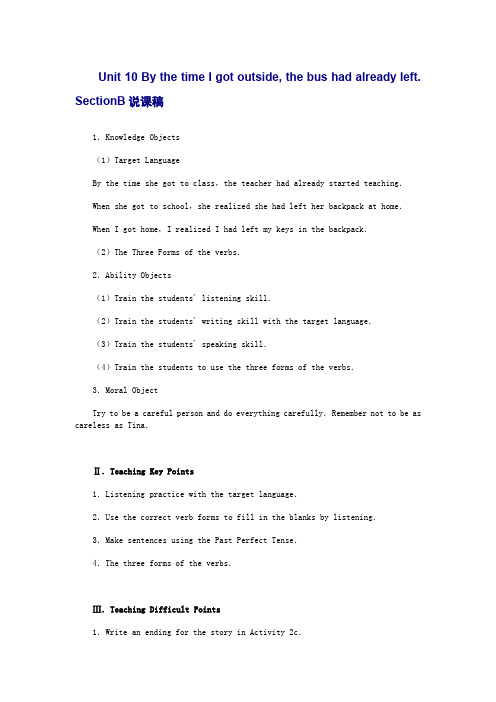
Unit 10 By the time I got outside, the bus had already left. SectionB说课稿1.Knowledge Objects(1)Target LanguageBy the time she got to class,the teacher had already started teaching.When she got to school,she realized she had left her backpack at home.When I got home,I realized I had left my keys in the backpack.(2)The Three Forms of the verbs.2.Ability Objects(1)Train the students' listening skill.(2)Train the students' writing skill with the target language.(3)Train the students' speaking skill.(4)Train the students to use the three forms of the verbs.3.Moral ObjectTry to be a careful person and do everything carefully.Remember not to be as careless as Tina.Ⅱ.Teaching Key Points1.Listening practice with the target language.2.Use the correct verb forms to fill in the blanks by listening.3.Make sentences using the Past Perfect Tense.4.The three forms of the verbs.Ⅲ.Teaching Difficult Points1.Write an ending for the story in Activity 2c.2.The three verb forms in Grammar Focus.Ⅳ.Teaching Methods1.Listening2.PairworkⅤ.Teaching AidsA tape recorderⅥ.Teaching ProceduresStep Ⅰ Revision1.Revise what happened to Tina in the morning by asking one or two students to tell the stroy on page 68.They may say like this:Tina had a bad morning.First of all she overslept.By the time she got up,her brother had already gotten in the shower.And by the time she went outside,the bus had already left.She had to run all the way to school.When she got to school,she realized she had left her backpack at home.All these made her look stressed out.After that,ask the whole class to work in pairs.telling the stroy and helping each other in turns.Remind them to use the correct verb forms.2.Ask students to check each other's homework in pairs,pointing out all the mistakes they might have made.3.Revise the Past Perfect Tense by asking the children when to use it and what its verb structure is.Step Ⅱ 2aThis activity provides guided listening practice using the target language.We have known Tina had a bad morning.But something worse happened to Tina later.Let's go to Activity 2a on page 69 and see what happened to Tina later in the morning.Read the instructions to the class.Be sure that all of them know what to do.Call the students' attention to the four pictures.Get them to guess the correct orderof the pictures first.The first one is given as a sample.Ask one or two children to tell their stories by describing the pictures according to their own order.Then,we will hear Tina talking about what happened to her after she got to school.We can see there is a small box in each picture.Please write a number from 1 to 4 in each box to show each picture's correct order.The first one has been given as a sample.Get the children to get ready to listen to Tina continue her story.Play the recording the first time,students only listen.Play the recording again and ask the children to number each picture.Check the answers with the class and see who have ever got the correct answers without listening.AnswersThe pictures should be numbered in this order:3 1 2 4TapescriptBoy:So then what did you do,Tina?Girl:Well,I ran home to get my backpack.But when I got home,I realized I had left my keys in the backpack.Boy:You're kidding!Girl :So I ran back to school without my keys or my backpack.And by the time I got back to school,the bell had rung.Boy:Oh,no!Girl:And by the time I walked into class,the teacher had started teaching already.She asked for our homework,but of course I didn't have it.Step Ⅲ 2bThis activity gives students practice in understanding and writing the target language.Ask the students to read the instructions together.Point out the blanks in the sentences and the verbs in the brackets.This activity has two parts.First let's fill in the blanks with the correct verb forms.We can see some verbs in the brackets.They are the base forms of the given verbs.For example,get and got,Get is the base form of the verb.Your job is to write the correct forms of these verbs in the blanks.Look at number one.A sample answer is given.Let the students fill in the blanks with the correct forms individually.Move around the classroom collecting the common mistakes they may make.After they all finish writing,tell them to get ready to listen to the conversation and check their answers.I will play the recording again.Please check your answers and correct any mistakes you might have made while listening.Play the recording.Students listen and check their answers.Correct the answers by asking seven different students to say theirs to the class.Answers1.got home 2.realized 3.had left 4.got 5.had rung 6.walked 7.had startedStep Ⅳ 2cThis activity gives students oral practice with the target language.Ask the whole class to read the instructions together.We have a new task now.We know Tina was late for class.What do you think happened after Tina was late for class Work with a partner.Make up an ending for the story by continuing it.The beginning has been given.Get students to discuss in pairs,Complete the ending.Make sure they are talking in English.Move around the classroom,offering language support if needed.After ten minutes,ask students to stop discussing.Get some pairs of students to tell the class how they think the story ended.And let the whole class decide whose ending is the best.Tell each pair to write down their ending,or do it after class if time is not enough.Sample ending of the storyThe teacher looked at Tina and said,“Why are you late and where is your homework,Tina?”“I had a bad morning today.”Tina said sadly.“I'm sorry to hear that,but may I know what happened?”said the teacher.Then Tina told the teacher and the whole class her story.All her classmates laughed loudly after it.Some of them said,“Poor Tina!”Bob,one of Tina's classmates,stood up and said,“Well,Tina,I'd love to help you.Why not let me keep the keys for you?I would put your keys in my backpack.”Step Ⅴ Grammar FocusThis activity introduces the target language of this unit.Call students' attention to the sentences on the left.Ask four different students to read the foursentences and point out where had plus a past participle is used.Write the sentences on the blackboard.Draw a simple time line for each sentence to help students to understand the grammar focus.For example:Then get the students to look at the box.Teach students to read the three forms of each verbs first.Then ask several students to read the verbs to the class to see if they can read.Write the verbs on the blackboard.Ask the students to make sentences correctly using each form of the verbs in the box.For example:I usually get up at 6:30.I got up at 5:30 yesterday.By the time I got up,my sister had already gotten in the shower.Tell the students when we talk about the first thing that happened.We use had plus a past participle (had gotten)and when we talk about the second thing that happened,we use the simple past tense (got up).Ask some to read their sentences to the class.Ask the students to make their own lists of other verbs used in this unit.Tell them to put the lists in their notebooks using a three-column format like the one in the Look! section.The lists have to include these verbs: leave,walk,start,oversleep,ring,be.Check the answers.Some sample sentences with the three verb forms1.I got up at 6:30 every day.I got up at 6:00 yesterday.By the time I got up,my sister had already gotten in the shower.2.We usually go to school at 7:30.We went to school at 8:30 yesterday.By the time we got to the classroom,the students had gone to the chemistry lab.3.My father leaves home at 8:30.He left home at 9:30 this morning.When my father went outside,the bus had left.4.The teacher often starts teaching at 9:00.The teacher started teaching at 8:30 the day before yesterday.When Tina got to class,the teacher had already started teaching.The three forms of the verbs used in this unit:leave left leftwalk walked walkedstart started startedoversleep overslept oversleptring rang rungbe was/were beenStep Ⅵ SummarySay,In this class,we've done much listening and writing practice with target language.We've also done some oral practice in pairs.And we've discussed the Grammar Focus of this unit.Step Ⅶ Homework1.Write down the ending of Tina's story.2.Make sentences using each form of the verbs below:leave,walk,start,oversleep,ring,be3.Review the Grammar Focus.Step Ⅷ Blackboard DesignUnit 10 By the time I got outside, the bus had already left. 复习课实录T: Good afternoon, class.Ss: Good afternoon, Miss li.T: Sit down , please.Ss: Thank you.T: Today we’ll revise Unit 10. Let’s read the title twice.The teacher shows the title on the computer. The students read the title twice.T: As usual, we can work in groups and tell your partners what other things you thought according to the main points in this unit.The students work in groups and discuss. The teacher walks around the classroom to offer some help.T: Let’s stop here. Look at the screen and we begin to check the main phases.The teacher show the main phases on the computer. The students look at the phases and speak in English. The first four answer together. Then ask some individuals to ask.1.闹响2.把…忘在…3.忘记做…4.成功做到5.等待某人做某事6.让某人搭便车7.用车接8.穿衣给某人穿衣9.出席10.成百上千的11.结婚12.和某人结婚13.激起14. 熬夜15.出故障16.经过T: Now let’s read the phrases together.The students read them twice.T: So much for phrases. Let’s revise the Grammar. What tense did we learn in this unit?Ss: 过去完成时T: Let’s revise something about it.1. 构成: had +V过分2. 过去完成时态的含义:主要是表示在过去某个时间,或是动作之前已经发生或完成的动作.也就是:过去的过去.过去完成时态的用法:1、表示过去的过去,通常由when或by引导的短语或者从句做时间状语或时间状语从句①By the end of last year, I had learned about one thousand English words. (时间提示)②When I got there, they had already left. (动作提示)2、常用在宾语从句中①He told me he had already finished his homework.②I realized he had fooled me again。
by-the-time-i-got-outside,the-bus-had-already-lelf课件

6:00 6:10 6:25
6:40
7:10
got up
took a shower
went to work
did sports
washed clothes
﹜ When I did sports , I had gotten up .
By the time
﹜ When
I took a shower , I had done sports .
already gone to bed.
此外,过去完成时还可用于宾语从句中。
如:He told a radio interviewer that he had run
out of money to buy old bikes.
Look at the pictures , Tina had a bad morning yesterday. What did she do ? Please listen .
7. leave sth. + 地点 (把某物忘记在某处) 8. no wonder + 句子 (难怪……)
No wonder you are tired, you have been walking for hours.
Tina’s bad morning
Tina had a bad morning yesterday. She
Summary:
It’s a good habit to go to bed early in the evening and get up early in the morning. So you will never be in a hurry in the morning. Also, the whole day’s work depends on the plan in the morning.
九年级英语Unit10 By the time I got outside,the bus had already left.讲解及练习

第 1 页 (共4 页) 第 2 页 (共4 页)学校 姓名 班级 考场 考号---------------------------------○密------------------ -------------------○封----------------------------- -- --○线----------------------------※※※※※※※※※※※※※※※答※※※※※※※※※※※※※※※※※※题※※※※※※※※※※※※※※※※线※※※※※※※※※※※※※九年级英语Unit10 By the time I got outside,the bus hadalready left.讲解及练习1. 过去完成时(1) 构成:由助动词had + 过去分词 构成 否定式:had not + 过去分词 缩写形式:hadn‘t (2) 用法 过去完成时表示在过去某一时间或动作之前已经发生或完成了的动作。
(3) 它所表示的时间是―过去的过去‖。
①表示过去某一时间可用by, before 等构成的短语来表示②也可以用when, before, after 等引导的时间状语从句来表示 ③还可以通过宾语从句或通过上下文暗示。
When I got there, you had already eaten you meal. 当我到达那里时,你已经开始吃了。
By the time he got here, the bus had left. 到他到达这里时,汽车已经离开了2. by the time 直到…时候 指从过去某一点到从句所示的时间为止的一段时 如: By the time we got to his house, he had finished supper. 在我们到达他就已经吃完了晚饭。
3. 英语中表示―把某物遗忘在某处‖常用 leave + 地点 而不是forget+地点 如:Unluckily, I left my book at home . 不幸的是,我把书忘在家里了。
人教版九年级英语unit10知识点,单词讲解

人教版新目标英语9年级讲解-Unit 10 Unit 10 By the time I got outside,the bus had already left. 重点、难点、考点及疑点注释重点、难点、考点及疑点注释1. When I got to school, I realized I had left my backpack at home. (P76)我到学校时才发现把书包落在家了。
我到学校时才发现把书包落在家了。
(1)had left my backpack at home 这是一个过去完成时的句子,这是一个过去完成时的句子,表示在过去某一时间或表示在过去某一时间或某一动作之前完成的动作或存在的状态。
某一动作之前完成的动作或存在的状态。
By three o’clock yesterday afternoon we had finished the work.到昨天下午三点,我们已经完成了工作。
到昨天下午三点,我们已经完成了工作。
She had learned a lot of English before she went to school. 在上学之前,她已经学会了很多英语。
在上学之前,她已经学会了很多英语。
(2)left 是leave 的过去式,在此处意为“遗忘”,“忘记”,后面常有地点状语。
,后面常有地点状语。
Li Min left his dictionary in the reading-room yesterday. 昨天李民把词典忘在阅览室里了。
昨天李民把词典忘在阅览室里了。
特别提示特别提示forget 作“遗忘”解时,后面没有“遗忘”的地点。
作“遗忘”解时,后面没有“遗忘”的地点。
I have forgotten the book. 我忘记拿书了。
我忘记拿书了。
2. My alarm clock didn’t go off, and by the time I woke up, my father had already gone into the bathroom and I had to wait for him to come out. (P78)我的闹钟坏了,因此等我醒来的时候,我父亲已经进去洗澡了,我只好等他出来。
by_the_time_I__got__outside,the_bus_had_aleady_left.

2c
pair work
Make up an ending for the story and share it with the rest of the class.
The teacher looked at Tina and asked her to sit back her seat. After class, the teacher asked Tina to come to her office and why she was late. Tina told her the whole story this morning. The teacher asked her to get up earlier and not to be late for class.
What do you usually do in the morning before school?
go to school
Tina’s morning
She overslept
Someone was taking a shower
The bus left
She had to run to school quickly
2b
1.When I got home(get home), I realized (realize) I had left (leave) my keys in the backpack. 2.By the time I got (get) back to school, the bell had rung (ring). 3.By the time I walked (walk) into class, the teacher had started(start) teaching already.
九年级英语by the time i got outside,the bus had already left练习题3

Unit 10 By the time I got outside,the bus had already left.温故知新(课前复习类训练)●Word recycling and grammar reviewing(旧词循环和语法复习)Ⅰ.Write down the correct form of the word according to the request.(根据要求写出单词的相应形式。
)1.teach(名词)______________2.leave(过去式) ______________3.reply(同义词) ______________4.realize(现在分词) ______________5.forget(过去分词) ______________6.early(比较级)______________7.final(副词) ______________ 8.ring(过去分词) ______________9.dress(第三人称单数形式) ______________ 10.really(形容词) ______________答案:1.teacher 2.left 3.answer 4.realizing 5.forgotten 6.earlier7.finally8.rung 9.dresses10.realⅡ.Fill in the blank with the right word form.(用单词的适当形式填空。
)1. _________they_________(get)to the farm on time last Monday?2.You can finish the work_________(easy).3.I _________never_________(be)late for school.4.you ever_________(forget)a relative’s birthday?5.They gave me a_________(ride)on the way to school.答案:1.Did,get由last Monday可知应用一般过去时。
Unit_10__by_the_time_I_got_outside._the_bus_had_already_left._教学建议
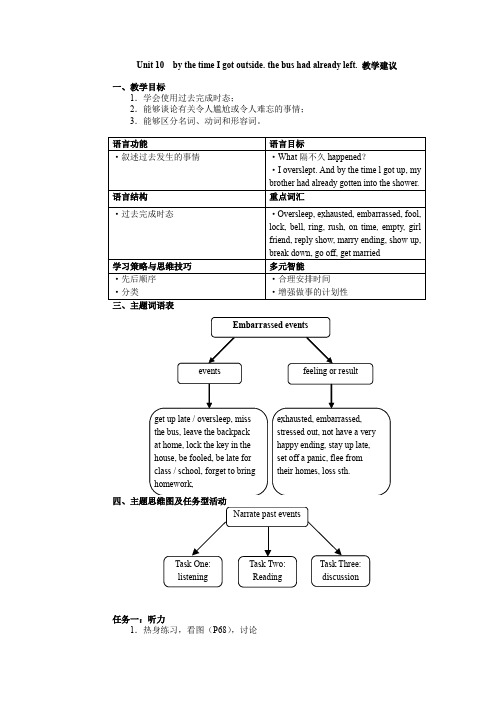
Unit 10 by the time I got outside. the bus had already left. 教学建议一、教学目标1.学会使用过去完成时态;2.能够谈论有关令人尴尬或令人难忘的事情;3.能够区分名词、动词和形容词。
任务一:听力1.热身练习,看图(P68),讨论What do you usually do in the morning before school?Do you get up early in the morning?Are you late for school?What happened to Tina?2.通过听力练习,帮助学生输入地道的语言材料,为提高学生口语表达能力及输出奠定基础。
任务二:阅读1.通过阅读训练,培养学生获取信息的能力,同时巩固句型和扩大词汇量2.学会欣赏,在学生获取信息的基础上,引导学生欣赏和积累优美、正确、地道的语言材料,为口语和书面表达奠定基础。
3.通过阅读,了解到西方国家愚人节发生的事情,并引导学生理智地分析所发生的事件任务三:讨论1.叙述Tina的经历,并为其经历续写结尾2.回忆并叙述我们生活中经历的尴尬事情3.回忆并叙述生活中难以忘怀的事情五、可供教师选择的任务活动Sample 1 Tina尴尬的早晨(with the help of the pictures on the book), 并为故事续写结尾。
引导学生用过去完成时态,叙述事情,注意事情发生的先后顺序,发挥想象给出一个合理的结尾。
操作建议:1.完成听力任务(1b, 2a & ab)朗读对话,加强语言输入2.同桌之间根据图示以第三人称叙述Tina的经历3.全班共同讨论故事的结尾,看谁给出的结尾更符合逻辑关系又体现人与人之间的友爱。
拓展的词汇:forgive, stationeries, habitsSample 2 谈谈上周的某天或进来的某个早晨发生的事情。
Unit;10;By;the;time;I;got;outside,;the;bus;had;alr

Unit;10;By;the;time;I;got;outside,;the;bus;had;already;left.unit 10 by the time i got outside, the bus had already left.一. 教学内容:unit 10 by the time i got outside, the bus had already left.【学习目标】1. 通过本单元的学习,驾驭过去完成时态的用法,特殊是与一般过去时态和此时此刻完成时态的区分。
2. 合理支配自己的学习和生活,守时守信。
二、教学重点难点:过去完成时态的用法及本模块中的一些重点短语三、重点词和短语1. by the time 到……时候2. get dressed 穿衣服3. run all the way to school 一路跑向学校4. leave +物+地点把某物落在某地【即学即用】he his umbrella in the train.a. leaveb. leftc. forgotd. forget5. no wonder 难怪6. run back to school 跑回学校7. start doing / to do 起先做某事8. go off 发出响声【即学即用】in the morning, i didn’t hear my alarm clock .a. going offb. went offc. go offd. to go off9. wait for sb. to do sth. 等待某人做某事10. run off / away 跑掉离开11. unfortunately 不幸地luckily 幸运地【即学即用】, he didn’t pass the english exam again.a. luckilyb. fortunatelyc. unfortunatelyd. unfortunate12. on time 准时in time 刚好【即学即用】people to the meeting all arrived here .a. in timeb. on timec. after timed. for time13. give sb a ride 让某人搭便车【即学即用】he walked me and asked where i was going and told me that they offered to .a. by; give me a rideb. off; give me ridesc. by; give me some feetd. through; give me a walking make it14. break down 出故障【即学即用】my bike on my way to school, so i had to walk there.a. broke outb. broke inc. broke downd. broke away15. show up 出席;露面【即学即用】he didn’t until supper was nearly over.a. show offb. show upc. show roundd. show in16. stay up late 熬夜到很晚stay up all night studying 熬夜学习17. costume party 化装舞会18. happen to sb 某人发生了什么事happen to do 碰巧做某事19. set off 激起set off=set out 启程/起程【即学即用】his action a heated argument.a. set outb. set upc. set offd. set free20. across the whole country 普及整个城市21. thousands of 成千上万22. flee-fled-fled 逃离flee from + 地点从某地逃离flee away 逃离/逃跑23. sell out 卖光24. marry sb=get/be married to sb 和某人结婚四、重点、难点、考点及疑点注释1. i started walking, but i knew i couldn’t get to school on time. 我起先步行,但我知道我已经不能按时到达学校了。
初四上学期Unit 6 By the time I got outside, the bus had already left单元测试题及答案

Unit 6 By the time I got outside, the bus had already left.一、单项填空(共15小题,计15分)( ) 1. —Do you have any _________ April Fool’s Day?—Yes, my aunt is there.A. friendsB. teachersC. relationsD. students( ) 2. I felt _________ when my wife complained the food was terrible.A. embarrassingB. embarrassedC. excitedD. exciting( ) 3. —Why are you angry with Michael?—Because I waited for him for two hours last night, but he didn’t _________ at last.A. show upB. hand upC. come upD. stay up( ) 4. —What did Mr. Wang say just now?—He __________ the results of the basketball game.A .fled B. announced C. created D. developed( ) 5. —How was your English examination, my dear?—I did well, mom __________, Jason didn’t do very well .He has to study hard.A. casuallyB. probablyC. luckilyD. unfortunately( ) 6. —How many people are coming to the game next month?—It’s hard to say. _________ people, I think.A. Thousand ofB. Thousands ofC. Two thousandsD. Two thousands of( ) 7. What happened _________ your little sister _________ April Fool’s Day?A. on; inB. at; onC. by; atD. to; on( ) 8. —There goes the bell. It’s time for home.—Sorry, it’s just my alarm clock _________.A. going offB. running offC. setting offD. breaking off( ) 9. —I can see some students in Class Two playing in the playground.—Yeah, they are playing happily. But where are __________ students?A. othersB. the otherC. anotherD. the others( ) 10. There are many changes here.You can find many tall buildings on _________ sides of the streets.A. allB. eachC. bothD. either( ) 11. —Why are you so hungry?—Oh, I was reading a book at lunch time .It’s _________ interesting _________Iforgot to eat.A. such; thatB. so; thatC. too; toD. enough; to( ) 12. Susan __________ her schoolbag in the library, so she had to fetch it.A. forgotB. lostC. leftD. fell( ) 13. —How long have your uncle and your aunt _________?—For three years.A. marriedB. has marriedC. got marriedD. been married( ) 14. —Did you see Jack at the party last night?—No, he _________ by the time I got there.A. would leaveB. leavesC. had leftD. has left( ) 15. —Give my best wishes to your mother.—__________.A. Thank you for your kindness.B. It doesn’t matter.C. It’s my pleasure.D. Are you kidding.二、完形填空(共10小题,计10分)When I was growing up I do not recall hearing the words ―I love you‖ from my father. When your father never says them to you when you are a ___16_ , it gets tougher and tougher for him to say those words as he gets older, To tell the truth, I had ___17__ said those words to him either, I ___18__ to make the first move, So in our next phone call I said ―Dad I love you!‖There was a silence at the other end and he then ___19__, ―Well, same back to you!‖ I laughed and said, ―Dad, I know you love me, and when you are ___20__ to say something, I can know___21__ you will say.‖A few weeks later , Dad ended a phone call ___22__ the words, ―Paul, I love you.‖ I was at work at that time and the tears (眼泪) were rolling down my cheeks as I finny ―heard‖ the love. As we both sat there in tears, we ___23__ that this moment had taken our father-and –son relationship to a new level.Several days after this ___24__ moment, my father had heart surgery (心脏手术). Many times since, I have thought about it. ___25__ I didn’t take the first step and Dad didn’t come out well after the surgery, I would have never ―heard‖ the love.( ) 16. A. child B. student C. worker D. father( ) 17. A. ever B. usually C. never D. always( ) 18. A. afforded B. decided C. helped D. continued( ) 19. A. wrote B. shouted C. explained D. replied( ) 20. A. able B. convenient C. ready D. afraid( ) 21. A. how B. what C. where D. why( ) 22. A. with B. at C. on D. in( ) 23. A. argued B. wondered C. realized D. asked( ) 24. A. dark B. special C. wrong D. strange( ) 25. A. Although B. Since C. Unless D. If三、阅读理解(共15小题,计24分)ALadies and Gentlemen,In Xi’an, we have visited lots of places of interest. I believe everyone really enjoys this travel. Our next stop is Beijing –the capital of China. The train from Xi’an to Beijing is convenient. This is the timetable and the fare. If you have any questions, please ask me. I hope you enjoy my( ) 26. Which train to Beijing will take the least time?A.T152B.T8C.T28D.1346( ) 27. How much will you have to pay air least if you buy 5tickets for hard sleepers?A. $32B. $275C. $160D. $87( ) 28. If the visitors choose the K118, they need to arrive at the train station at about __________.A.2:00pm.B.4:00pm.C.8:00pmD.11:00pm.( ) 29. What does speaker do probably?A.A foreign visitorB.A clerk at the train stationC.A guideD.A computer programmerBMy Dad was a fisherman. He worked hard and would stay out until he caught enough to feed the family nearly every day.When the weather was bad he would drive me to school. He had this old truck that he used in his fishing business. That truck was older than he was. When we got to the school, he would give me a big kiss on the face and tell me to be a good boy. It was so embarrassing (令人难堪的)for me. I was 12years old, and my Dad would lean over and kiss me goodbye! I remember the day I decided I was too old for a goodbye kiss. When we got to the school and came to a stop, he had his usual big smile. He started to lean toward me, but I p ut my hand up and said, ―No, Dad. It was the first time I had ever refused him. He had this surprised looked at me for the longest time, and his eyes started to be wet. He turned and looked out the windshield. ―You're right,‖ he said. ―You are a big boy....a man. I won't kiss you anymore.‖It wasn't long after that when my Dad went to sea and never came back. It was a day when most of the fishermen stayed at home, but not dad. He had a big family to feed…How I wish I had been a man then. If I had been a man, I would never have told my Dad I was too old for a goodbye kiss.( ) 30. What does the underlined word ―feed‖ mean?A. 收留B. 教育C. 养活D. 捐助( ) 31. When the weather was bad, the writer went to school?A. In his father’s boatB. In his father’s truckC. By bikeD. On foot( ) 32. He felt so embarrassed because __________.A. his father kissed him goodbyeB. his father drove him to schoolC. his father’s trunk was too oldD. his father said he was a bad boy( ) 33. The purpose of the passage is to tell us __________.A. what a big man the writer’s father wasB. how the writer’s father caught fishC. the writer took pride in his fatherD. the writer felt sorry for his father and himselfCThe summer holidays are coming. Some kids have already made great plans for the summer. Travel for funMany teens say they will travel with their parents during the holidays. Fan Zhe from Yantai will go to Shanghai with his parents. ―I will need a break, as I will be really tired of tests by that time,‖ said Fan. Gao Yuan will spend his holidays far away from his parents. From August 10, the 15-year–old boy and 20 other students at Shanghai Weiyu Junior Middle School will spend 18 days in Australia.Summer studiesSome teens are spending the summer studying. Xing Wei from Tianjin and Zhou Xiaolin from Beijing have to go to math ,physics and English classes. Their parents think this will help their future studies. But Xiaolin is unhappy, ―I will spend my holidays playing with numbers. How boring!‖Plenty of activitiesLi Yuanchen from Hefei will be doing all the usual things. ―I will be traveling a little bit, partying with friends and reading books,‖ he said. Shanghai’s Ma Jiameng said she will spend a lot of time with friends, doing different things. ―We will do some drawing and go swimming. I will also write short stories,‖ Jiameng said.Summer is a great chance to do many interesting things. Keeping fit is an easy and cheap way to have fun. Running, swimming and dancing are all great exercises. There is always volunteer work to do, too. Do something! Anything! If you don’t, you will be sorry when September comes. ( ) 34. How long will Gao Yuan stay in Australia?A. For 2 monthsB. For 20 daysC. For 18 daysD. For 45 nights( ) 35. How will Zhou Xiaolin spend her holidays this summer?A. She will write some short stories.B. She will spend a lot of time with friends, doing different things.C. She will have to go to math, physics and English classes.D. She will travel to Australia.( ) 36. How many people are mentioned in the passage?A. 5B. 6C. 7D. 8( ) 37. What is the writer’s opinion according to the passage?A. The summer holidays are the best time of the year.B. Children should travel during the summer holidays.C. Children must do a lot of volunteer work on holiday.D. Children should do something interesting during their summer holidays.DYou may know the word ―astronaut‖. But do you know the word ―taikonaut‖? It means ―Chinese astronaut‖ in English. It comes from the Chinese pinyin ―taikong‖ and the English word ―astronaut‖. In 1998, a Malaysian Chinese scientist used the word for the first time. Since then, because of the fast dev elopment of China’s space industry (工业), more and more people all over the world have known the word. In September, 2008, taikonauts caught many people’s eyes again.The Shenzhou-7 spacecraft (宇宙飞船) that carried three taikonauts took off from China’s Jiuqu an Satellite Launch Center on September 25th. It’s the third time for China to send people into space. During the flight in space, some tasks were completed and the 20-minute spacewalk was the most exciting one. With the help of his two teammates Liu Boming and Jing Haipeng, Chinese taikonaut Zhai Zhigang completed China’s first spacewalk. China has become the third country to finish such an outer space activity following Russia and the U.S.A. All the Chinese people are proud of our country.( ) 38. What does ―taikonaut‖ mean in English?A. Chinese astronaut.B. Chinese scientist.C. Chinese center.D. Chinese Taikong.( ) 39. Which countries have finished such an outer space activity?A. Russia and the U.S.A.B. Russia and China.C. China and the U.S.A.D. Russia, the U.S.A. and China.( ) 40. Which sentence is NOT true according to the passage?A. It’s the third time for China to send people into space.B. Russia and the U.S.A. have already finished outer space activity.C. The Shenzhou-7 spacecraft was sent into space on September 25th, 2008.D. Zhai Zhigang completed 20-minute spacewalk without the help of his twoteammates四、单词拼写(共5小题,计5分)根据首字母提示写出句中所缺单词41. I’m terribly sorry that I b_________ your glasses into pieces.42. Do not forget to l__________ the door before you leave.43. My best friend got m__________ last week.44. I phoned him many times but he didn’t r__________ even once.45. The fridge is nearly e__________. Let’s go to the supermarket to buy some vegetables.五、综合填空(共10小题,计10分)Today is Sunday. Orson found it was fine when he got up in the morning, so he (46)d __________ to travel in the country in a car. But unluckily, a traffic accident happened and he had to (47) w_______ __ for three hours. Before he started again, it began to (48) r_________. So it was wet on the country road. He had to drive (49) s__________.After about half an hour, when he drove on a (50) b__________ over the river, the bridge was broken. His car dropped into the water and he had to ask some villagers to (51) p________ it out of the river. Of course, he had to pay a lot for it. When he got to a small town, night fell. He stopped his (52) c_________ near a small restaurant, wet and hungry.There were few people in it. In the poor light, he found (53) e__________ was dirty. He knew it was difficult to find a (54) c__________ restaurant. He had to sit down and told the waiter to bring some food to him. About fifty minutes (55) l__________, the waiter brought a fried chicken to him. He had a look at it and found it had only one leg.Robert was really out of luck today.六、阅读表达(共5小题,计10分)My husband and I had been out of work for many months. 58 In order to make a living, we decided to go to work in a small town which was 2,200 miles away. My husband and I went there in an old car.In order to save money and time, we took a short but desolate (荒凉的) route. Unfortunately, our car broke down in the middle of the night. It was freezing outside, so I didn’t know if we were going to make it out.We saw a dim (暗淡的) light in the distance. My husband and I went towards it. The light came out of a small house. We knocked at the door. A man came out and spoke with my husband. And then he invited us into his home. He and his wife took us in, gave us some food, making us feel ourselves at home.The next morning, we used the man’s phone to call a friend and get a ride, leaving our broken car behind. We gave our new address to the couple and said we were coming back after we settled down in the new town. The couple gave us food and water for our journey. Two days later, the man drove our car and found us in the town. He had the car repaired. He refused to take anythingI will never forget the couple because they helped us out when we were in trouble.(一) 根据短文内容回答问题56. What happened to the woman and her husband on the way to a small town?57. How did the couple help the woman and her husband?(二) 翻译句子58.59.(三) 给短文拟一个适当的标题60.七、完成句子(共4小题,计6分。
By the time I got outside, the bus had a...
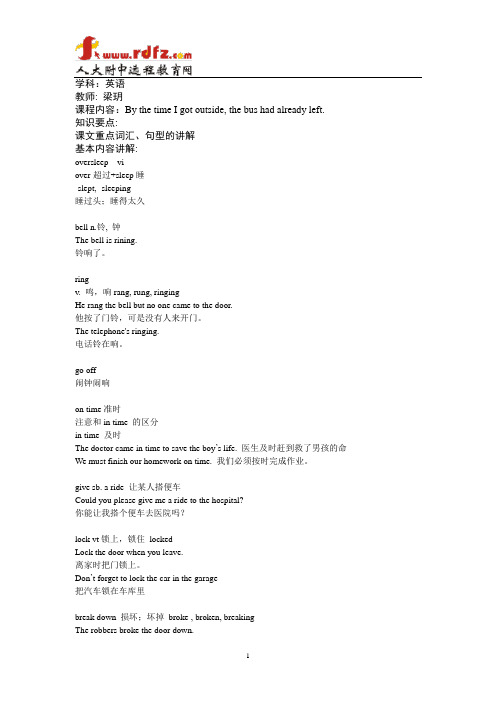
学科:英语教师:梁玥课程内容:By the time I got outside, the bus had already left.知识要点:课文重点词汇、句型的讲解基本内容讲解:oversleep viover-超过+sleep睡-slept, -sleeping睡过头;睡得太久bell n.铃, 钟The bell is rining.铃响了。
ringv. 鸣,响rang, rung, ringingHe rang the bell but no one came to the door.他按了门铃,可是没有人来开门。
The telephone's ringing.电话铃在响。
go off闹钟闹响on time准时注意和in time 的区分in time 及时The doctor came in time to save the boy’s life. 医生及时赶到救了男孩的命We must finish our homework on time. 我们必须按时完成作业。
give sb. a ride 让某人搭便车Could you please give me a ride to the hospital?你能让我搭个便车去医院吗?lock vt锁上,锁住lockedLock the door when you leave.离家时把门锁上。
Don’t forget to lock the car in the garage把汽车锁在车库里break down 损坏;坏掉broke , broken, breakingThe robbers broke the door down.强盗们把门砸开了。
break down 也有抛锚的意思Our truck broke down outside town.我们的卡车在城外抛锚了。
costumen. 服装;全套服装Her national costume showed which country she came from.她的民族服装表明了她是从哪个国家来的。
Unit 10 By the time I got outside, the bus had already left
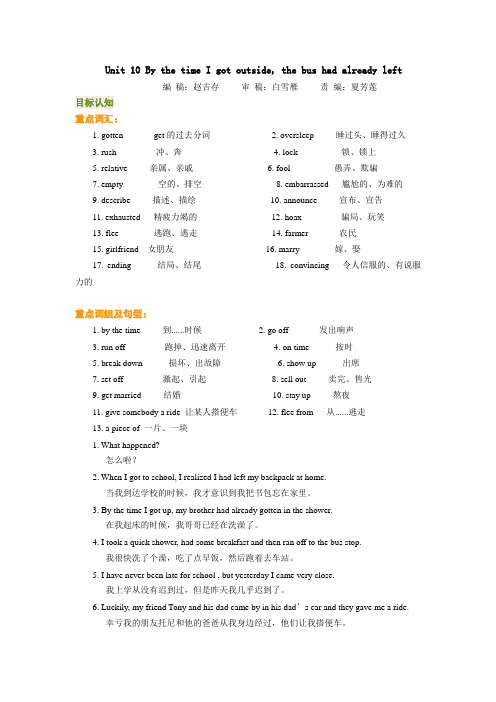
Unit 10 By the time I got outside, the bus had already left编稿:赵吉存审稿:白雪雁责编:夏芳莲目标认知重点词汇:1. gotten get的过去分词2. oversleep 睡过头、睡得过久3. rush 冲、奔4. lock锁、锁上5. relative 亲属、亲戚6. fool愚弄、欺骗7. empty空的、排空8. embarrassed尴尬的、为难的9. describe描述、描绘10. announce宣布、宣告11. exhausted精疲力竭的12. hoax骗局、玩笑13. flee逃跑、逃走14. farmer农民15. girlfriend女朋友16. marry嫁、娶17. ending结局、结尾18. convincing令人信服的、有说服力的重点词组及句型:1. by the time 到......时候2. go off发出响声3. run off 跑掉、迅速离开4. on time按时5. break down损坏、出故障6. show up出席7. set off 激起、引起8. sell out 卖完、售光9. get married 结婚10. stay up 熬夜11. give somebody a ride 让某人搭便车12. flee from 从......逃走13. a piece of 一片、一块1. What happened?怎么啦?2. When I got to school, I realized I had left my backpack at home.当我到达学校的时候,我才意识到我把书包忘在家里。
3. By the time I got up, my brother had already gotten in the shower.在我起床的时候,我哥哥已经在洗澡了。
Unit 10 By the time I got outside, the bus had already left. grammar

6. 昨天找看见李平了。自从我们离开北京,就一直 没有见面。 I saw Li Ping yesterday. We had not seen each other since we left Beijing.
7. 我昨天没有给魏华那本书,因为她已经为自己买 了一本。 I did not give the book to Wei Hua yesterday, because she had already bought a copy for herself.
did not go • 6. Last night we __________ back home until the teacher left school. (not go) was put • 7. Comrade Li Dazhao __________ in prison in 1927. (put) • 8. I'll tell him the news as soon as he comes __________ back. (come) to have • 9. John stopped __________ a rest (have) has worked because he __________ for three hours. (work) • 10. I haven’t heard from my daughter since last _______________ month. (hear from)
七、过去完成时的用法
1、概念:表示过去的过去。 -----------|----------------|--------------------|----> 那时 过去分词 构成 否定式:had not + 过去分词 缩写形式:hadn’t
九年级新目标英语unit10短语和重要句型归纳

九年级新目标英语unit10短语和重要句型归纳unit10.by the time i got outside the bus had already left.一、重点短语section a1.到…的时候_____________2.淋浴____________3.进浴室____________4.从浴室出来______________5.把…忘在家里______________6. (闹钟)闹响_____________7.迅速离开______________ 8.捎某人一程_____________9.停止运转、出故障_________________10.出席、露面____________11.愚人节________________12.激起,引起______________13.卖完,售完___________ _______________14.结婚_______________ 15.一片,一块____________ 16.到他起床的时候,他的哥哥已经进浴室了._____________________17.到他进教室的时候,老师已经开始讲课了。
______________________18.为这个故事编个结尾____________________19.和某人分享…________________20.等候某人做某事______________________ 21.出来,花开,出版______________22.准时______________23.及时____________ 24.难怪、怪不得_____________25.成功_____________26.穿好衣服____________ 27.从旁边经过、路过_____________28.让某人搭车_____________section b29.邀请某人做某事_______________30.化装舞会_____________ 31.熬夜_____________32大卫在愚人节那天发生了什么事?______________________ 33. 在第一天_____________34. 近几年中国发生了巨大的变化。
九年级英语By the time I got outside,the bus had already left练习题1
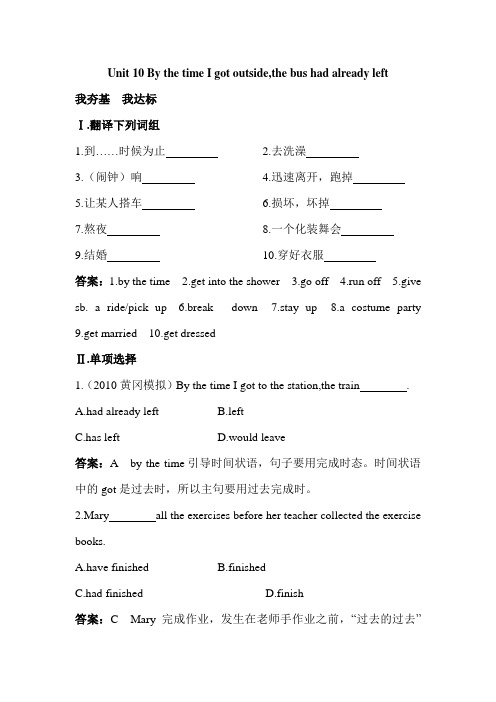
Unit 10 By the time I got outside,the bus had already left我夯基我达标Ⅰ.翻译下列词组1.到……时候为止2.去洗澡3.(闹钟)响4.迅速离开,跑掉5.让某人搭车6.损坏,坏掉7.熬夜8.一个化装舞会 9.结婚10.穿好衣服答案:1.by the time 2.get into the shower 3.go off 4.run off 5.give sb. a ride/pick up 6.break down7.stay up8.a costume party 9.get married10.get dressedⅡ.单项选择1.(2010黄冈模拟)By the time I got to the station,the train.A.had already leftB.leftC.has leftD.would leave答案:A by the time引导时间状语,句子要用完成时态。
时间状语中的got是过去时,所以主句要用过去完成时。
2.Mary all the exercises before her teacher collected the exercise books.A.have finishedB.finishedC.had finishedD.finish答案:C Mary完成作业,发生在老师手作业之前,“过去的过去”用过去完成时。
3.The people heard the bad news that the hero several hours ago.A.had diedB.has diedC.diedD.dies答案:A die这个动作发生在heard之前,发生在过去的过去。
4.By the time he was fourteen,he up a small chemistry lab.A.had setB.has setC.setD.sets答案:A by the time 加上一般过去时态,主句用过去完成时态。
陕西省汉中市佛坪县初级中学九年级英语全册Unit10BythetimeIgotoutside,thebushadalreadyleft教案人教新目

学科English 课型fresh 年级9课题Unit 10 By the time I got outside, the bus had already left. 1/5教学媒体A tape recorder , CAI教学目标知识技能1.Key Vocabularyoversleep, by the time, get outside, get to school, startdoing, be late for2.Target LanguageWhat happened?I overslept. By the time I got up, my brotherhad already gotten in the shower.By the time I got outside , the bus had already left.When I got to school, I realized I had left my backpack athome.过程方法1.According to listening to Encourage the students to usethe new words.2.According to speaking to train the students to narratepast events with the past perfect tense.情感态度It’s a good habit to go to bed early in the evening andget up early in the morning. So you’ll never be in a hurryin the morning.教学重点1.Key Vocabularyoversleep, by the time, get outside, get to school, start doing, be late for2.Target Language3.Narrate past events with the Past Perfect Tense教学难点1.Train the students to narrate past events with the Past Perfect Tense. 2.Train the students to understand the target language in spoken conversation.教学内容及问题情境学生活动设计意图Step 1 RevisionDictate the following words:by mistake, by accident, according to , fall into , in this wayStep 2 PresentationⅠb1.Ask the students to discuss these Write somephrases on thenotebook.Discuss thesequestions in agroup.Describe thepictures inactivity 1a.复习前一单元所学短语,进行知识巩固。
Unit10--By-the-time-I-got-outside.九年级第十单元

Unit10--By-the-time-I-got-outside.九年级第十单元Unit10 By the time I got outside,the bus had already leftI.高频词组1.by the time 到........时候2.go off 发出响声,闹响3.run off/away 跑掉,离开4.on time 准时5.break down /out 损坏;;爆发6.show up 出席,路面7.set off 启程,引起8.get married 结婚9.rush at/out of 朝某人冲;冲出.......地方10. feel /get exhausted 筋疲力竭11.convince sb of sth 是某人相信某事12.in one’s forties 在某人四十几岁13.sell out 卖光14.get dressed 穿衣服15.no wonder 难怪16.happen to sb 发生在某人身上II.重点词法知识1.到…时候by the time +…(句子)…从过去某一点到从句所示时间为止的一段时间,即从句用过去时,主句用过去完成时。
2.(闹钟)闹响go off3.跑掉;迅速离开run off4.损坏break down (突然)中断break off5.(在)愚人节(on) April Fool's Day6.激起;引起set off7.一片,一块a piece of8.按时on time 及时in timeSection A1.从…离开去…leave (from)…for …把某物遗忘在某地leave sth. +介宾短语(表地点的)忘记某人/某事forget sb /sth.忘记去作…forget to do …忘记已作了…forget doing …2.在洗沐浴get in the shower3.开始作…start/begin to do …(前后不同的事)start/begin doing …(前后相同的事)4.我上学从未迟到,但昨天我差点迟到.I 've never been late for school ,but yesterday I came very close.5.等待(某人)作…wait (for sb )to do …6.出来;开花come out 实现come ture 从旁而过come by 来自…come/be from…7.我必须抓紧了.I had to really rush.8.飞快冲了个澡take/have a quick shower9.给/让某人搭便车give/get sb. a ride =give /get a ride to sb.10.我恰好赶上上课.I only just made it to my class.(此时,指"约定"之意)Section B1.给某人穿衣服dress sb.穿(…)衣服be /get dressed (in +衣服)化装;打扮dress up2.熬夜stay /sit up (late)3.给某人看某物show sb .sth.=show sth .to sb.带某人参观…show sb.around sth.卖弄…show off…出席,露面show up展览be on show =be on display4.化妆舞会a costume party5.在地球着陆land on the earth6.由演员奥森·威尔斯主持的广播节目a radio program by actor Orsom Welles7.遍及全国across the whole country =all over the whole country8.从…逃跑;避开…flee from…=run away from…(flee过去式为fled )9.将有…the re will be ….(一般将来时)there would be …(过去将来时)10.买尽可能多的意大利面条buy as much spaghetti as they could /possible11.让某人嫁过某人ask sb .to marry sb.结婚get married和…结婚get /be married with …=marry …12.停止作…stop doing … 停下某事来作…stop to do …13.在开学第一天on the first day of school14.(向某人)打招呼say hello (to sb.)15.醒来wake up 叫…醒来wake sb. up16. 有一个很愉快的结局have a very happy ending17.失去了他的女朋友和他的观众lose both his girlfriend and his showIII .重要句型1.By the time I hot out,the bus had already left.2.When I got to school, I realized that I had left my backpack left.3.Wells was so convincing that hundreds of people believed the story ,and panic set of across the whole country.IV..语法. 过去完成时(1) 构成:由助动词had + 过去分词构成否定式:had not + 过去分词缩写形式:hadn’t(2) 用法:过去完成时表示在过去某一时间或动作之前已经发生或完成了的动作。
人教新目标版英语九《Unit 10 By the time I got outside, the bus had already left》
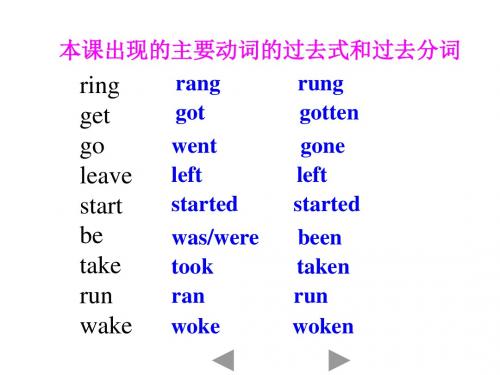
3. wait for sb. wait to do sth.
“等某人”, “等着做某事”,
wait for sb to do sth. “等某人做某事”。
4. on time
at any time
准时
in time
all the time
及时
一直;始终 有时,不时
H.the movie had started.
Grammar Focus
1. Past perfect Tense 过去完成时
构成:had+过去分词
2. 过去完成时可以表示过去某一时刻
或某一动作之前完成的动作或呈现
的状态。也就是说发生在“过去的
过去”。
The Past Perfect Tense 过去完成时
过去完成时态的用法:
1、表示过去的过去,通常由when或by引导 的短语或者从句做时间状语或时间状语从 句 ① By the end of last year, I had learned about one thousand English words ② By the time he was twenty, he had won about ten medals ③ When I got there, they had already left
(3) give sb. a ride 意为 “让某人搭便车” ride n. e.g. If you go to the school, I can give you a ride. get a ride 意为“搭便车”。 e.g. I want to get a ride. 我想搭个便车。
6. I only just made it to my class. 我恰好到教室。
九年级英语_by the time I got outside,the bus had already left.

rang got went left started was/were took ran woke broke arrived knew
rung gotten gone left started been taken run woken broken arrived known
1. We ___________(learn) two had learned thousands words by the end of last year. 2. I had known ___________him when I was a student. 3. When we _______(arrive) at the arrived station, they __________(wait) for more than had waited twenty minutes. 4. One of the men couldn’t move, because had broken he __________ (break) his legs.
wash clothes
get up
6:00
7:00
现在
By the time I got up, my sister had already washed all the clothes.
The teacher came into the classroom
8:00 am
8:15
now
I got to school
根据句子意思和所给首字母提示,用适当单词完成句子
• Bad luck. I missed the early bus because I o____ t verslep this morning. • You must be e xhaustedafter swimming. Come and have a rest. • When I went out of the lift I r___ ealised I had left the key in the room. • The news has caused a p___ among the bus-drivers. We anic should try to solve it. tayed • In order to watch the football match, we s___ up last night. nding • The e____ of the movie was so moving that we couldn't help crying. ings • Will you answer the phone when it r____? ostume • The people wore historical c____ for the parade .(游行, 游行, 游行 展览) 展览) roken • My uncle’s car has b___ down for two days.
- 1、下载文档前请自行甄别文档内容的完整性,平台不提供额外的编辑、内容补充、找答案等附加服务。
- 2、"仅部分预览"的文档,不可在线预览部分如存在完整性等问题,可反馈申请退款(可完整预览的文档不适用该条件!)。
- 3、如文档侵犯您的权益,请联系客服反馈,我们会尽快为您处理(人工客服工作时间:9:00-18:30)。
1. We ___________(learn) two thousands words by the had learned end of last year.
had known 2. I ___________him when I was a student.
3. When we _______(arrive) at the station, they arrived __________(wait) for more than twenty minutes. had waited
Answer these questions 1. Why didn’t the writer get up early? Her alarm clock didn’t go off. 2. What did he do after he took the shower? She had some breakfast and ran off to bus stop. 3. At last how did the writer go to school? I was given a ride by Tony and his father
1.When I was doing my homework, the clock went off _____ ______. 当我正在做作业的时候,钟表响了。 2.We areclose _____ (临近) to the station . 3.He rushed into ______ ____ (冲进) the room and caught the thief. ran off 4.I tried to catch the thief but he____ _____ (跑开了) 5.Would you please give me ____ ____ _____ _____ a ride (搭便车)to the cinema? 6.When I got to school, the final bell was ringing, I ____ ____(刚好) made it to my class.
have breakfast
Tina _____ up late. got
had By the time she got up, her brother _______ gotten already _________ in the shower.
By the time she got outside, the bus had left ______ already _______.
Have you ever overslept?
Have you ever been late for school?
Have you ever forgotten to bring your homework to school? Have you ever locked your keys in your house? Have you ever forgotten a relative’s birthday? Have you ever forgotten a doctor’s or dentist’s appointment?
I’ve never been late for school, but yesterday I came very close. My alarm clock didn’t go off, and by the time I woke 醒来 ring up, my father had already gone into the
had broken 4. One of the men couldn’t move, because he __________ (break) his legs.
3a I’ve never been late for school, but yesterday I came very close. My alarm clock didn’t go off, and by the time I woke up, my father had already gone into the bathroom and I had to wait for him to come out. I had to really rush. I took a quick shower, had some breakfast, and then ran off to the bus stop. Unfortunately, by the time I got there, the bus had already left. I started walking, but I knew I couldn’t get to school on time. Luckily, my friend Tony and his dad came by in his dad’s car and they gave me a ride. When I got to school, the final bell was ringing. I only just made it to my class.
What do you usually do in the morning before school?
brush my teeth
What do you usually do in the morning before school?
take a shower
What do you usually do in the morning before school ?
本课出现的主要动词的过去式和过去分词
ring get go leave start be take run wake
rang got went left started was/were took ran woke
rung gotten gone left started been taken run woken
took a shower quickly
等他
Unfortunately, by the time I got there, the bus had Unluckily already left. I started walking, but I knew I couldn’t I could be late for school get to school on time. Luckily, my friend Tony and 按时 Fortunately his dad came by in his dad’s car and they gave
By the time I got to school, the teacher had come into the classroom.
By the time she got outside, the bus had already left.
她出去的时候,公共汽车已经开走了.
by the time 意思是 “到…的时候”, 相当于 when , 后接过去时的句子 时, 主语的谓语动词用过去完成时态.
过去完成时态的用法:
1、表示过去的过去,通常由by引导的短语做时间状 语或者由by / when / before引导的从句做时间状 语从句 ① By the end of last year, I had learned about one thousand English words. ② By the time he was twenty, he had won about ten medals. ③ When I got there, they had already left.
go into 进入 bathroom 卫生间 wait for 等待、等候 come out 出来、花开 rush 冲、跑 take a shower 沐浴、洗澡 run off 跑步离开 unfortunately 不幸的是 get to school 到学校 on time 按时、准时 came by 路过 make it 成功 give sb. a ride 捎某人一程
/klous/
现在完成时态
ห้องสมุดไป่ตู้
bathroom and I had to wait for him to
come out. I had to really rush. I took a 出来 run very quickly quick shower, had some breakfast, and then ran off to the bus stop.
④ They had already had breakfast before they arrived at the hotel. ⑤He said that he had never seen such a beautiful bird before.
2、常用在宾语从句中
① He told me he had already finished his homework.
• 关于get的词组小结 • get to school 到学校 • get into the shower 去洗澡 • get outside 到外边 • get home 到家 • get up 起床 • get married 结婚 • get dressed 穿好衣服 • get to class 到班级 • get bored 变得无聊 • get tired 变得疲劳
got By the time I ____(get) back to school, the bell had rung ________(ring).
walked By the time I _______(walk) into class, the had started teacher __________(start) teaching already.
